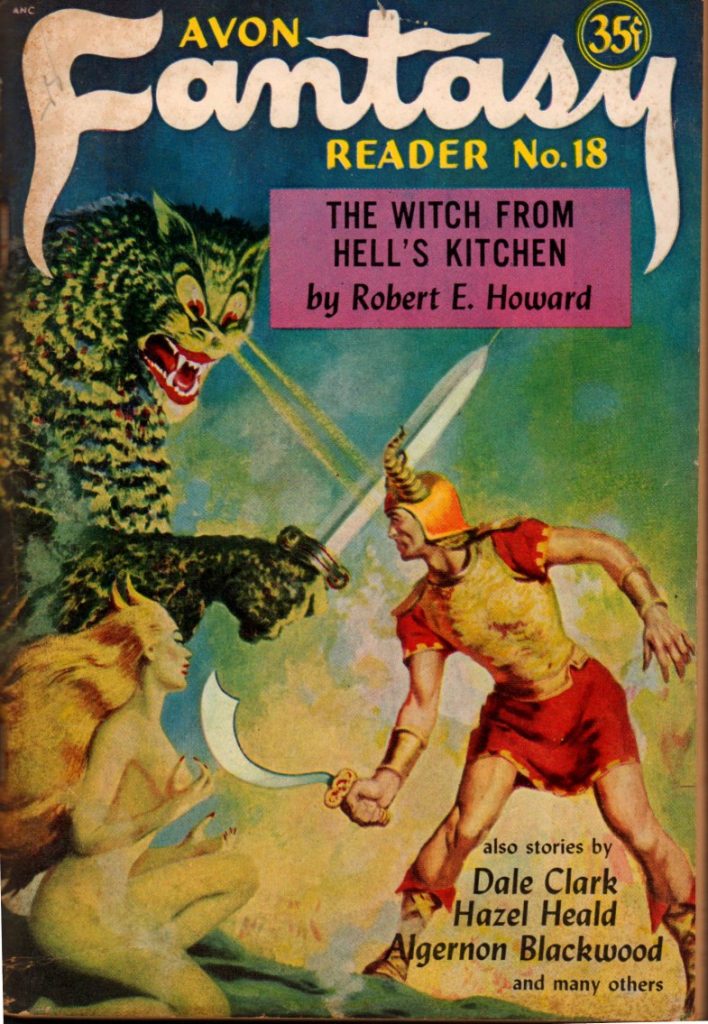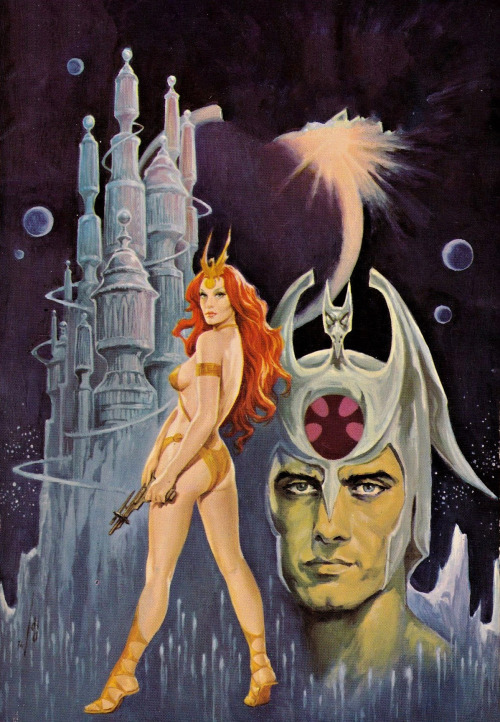SENSOR SWEEP: Lucrative Markets, Jive Turkeys, Immense Imagination, and the Whims of Adolescent Males
Monday , 26, June 2017 Sensor Sweep 6 Comments SFF History (The Pulp Archivist) The Age of Despair — “By the time ‘The Cold Equations’ killed off the Campbelline Revolution in 1954, science fiction sales had plateaued and most of the Campbelline authors, to include Asimov, the Kuttners, and Heinlein, had either abandoned science fiction entirely or sought out more lucrative markets. Science fiction magazines became increasingly dominated by an ever-shrinking authorship, and despair clung to the stories well into the 1980s, when Bruce Sterling would complain about the same types of stories as Gold.”
SFF History (The Pulp Archivist) The Age of Despair — “By the time ‘The Cold Equations’ killed off the Campbelline Revolution in 1954, science fiction sales had plateaued and most of the Campbelline authors, to include Asimov, the Kuttners, and Heinlein, had either abandoned science fiction entirely or sought out more lucrative markets. Science fiction magazines became increasingly dominated by an ever-shrinking authorship, and despair clung to the stories well into the 1980s, when Bruce Sterling would complain about the same types of stories as Gold.”
D&D (Gaming While Conservative) RPG Losers — “If you enjoy RPGs, then you don’t need the steady doling out of power-ups. If you enjoy the exploration, then the exploration is the reward. If you enjoy the game, then the game is the reward. You can spend countless hours at the table and not fret for a moment about how you will earn enough XP to finally reach the character you really want to play. The character you really want to play is the one right there on the cheeto-stained sheet in front of you right now! Strength 6, 1d4 HD thief though he be, he is yours, and he is enough.”
Pulp Revolution (Rampant Games) How to Write Pulp Fiction for Fun and Profit – Part 2 — “After the pulp era, science fiction suffered a decline in readership, to the point where it has become something of a niche. There are lots of arguments over the whys and hows of it, but as I implied in the intro, the success of big-ticket SF movies suggests there’s a hungry potential audience out there, but the industry is catering to only a tiny niche. I have nothing against serving a niche, mind you, but I think a huge potential is out there to grow the science fiction audience, and the potential is named PULP.”
With Fans Like These… (NPR) H.P. Lovecraft’s Monster Is Wrapping Family Game Night Up In Tentacles — “Loucks says Lovecraft fans don’t really like Lovecraft the man, and some don’t even like his writing, which is much more detailed than that of other writers of his time. But the fans do love the creatures and monsters he created.”
D&D (Walker’s Retreat) Making a D&D Campaign For Gamers: New Model Colony — “The final part, which will matter when I start looking for players, is the ‘Open Table’ element; play sessions are more-or-less self-contained, as they comprise of whomever shows up, and characters can be locked out due to downtime requirements or being tied up with other PC groups (hence the need for time records). I do know what is NOT out there: Dwarves, Elves, Halflings, Gnomes, and other Tolkien-derived Pink Slime favorites. (That means no Drow either.) I also have enough familiarity with my mythological sources to figure out how the monster palette works, and man that’s going to be fun. (Hint: the Mech Pilots throwing Monster Manual entries at me are going to short-circuit.)”
D&D (Dyvers) Dungeons & Dragons Doesn’t Have to Follow the Traditional Foundation Laid By Tolkien — “Over the years I’ve read stories from the early days of the hobby where Dungeons & Dragons players played in games that defied what has become known as the fantasy genre. Tanks, laser guns, machine guns, rocket ships, aliens, and B movie monsters made appearances. They pushed the boundaries of their imaginations and went wherever their fancies took them whether it was up an elevator or down a water slide into a mountain of treasure. So why did that stop? Why did we go from having a game that jumped the shark at every opportunity into one that dogmatically declared that you must play in a quasi-Medieval world where magic was in the ascendancy and technology was languishing behind?”
The Big Time (Kairos) Analog Mindset — “Pro authors don’t write for agents, editors, or publishers. They write for their readers. You know, the people whose hard-earned money pays your advance and any royalties you might earn? It’s not just gladhanding indie authors who leave Amazon reviews. Readers review books, too. Read them. Engage with your audience on social media. Trust me, they’ll make their preferences known. Once you know what they want, give it to them. Because they need a damn good reason to spend their money on your books instead of video games, movies, and beer.”
 Decline and Fall (The Arts Mechanical) Traditional SF Has Become The SF For People Who Hate SF — “The Marxists infiltrated at almost every level except the one that really mattered. That was the readers. The big problem was that, unlike countries where Marxism was the rule, the infiltrators, some of whom didn’t understand that they were supposed to be Marxists in the first place and went right into creating the same old propaganda… that nobody wanted to read.”
Decline and Fall (The Arts Mechanical) Traditional SF Has Become The SF For People Who Hate SF — “The Marxists infiltrated at almost every level except the one that really mattered. That was the readers. The big problem was that, unlike countries where Marxism was the rule, the infiltrators, some of whom didn’t understand that they were supposed to be Marxists in the first place and went right into creating the same old propaganda… that nobody wanted to read.”
Short Fiction (Goodreads) Adam Smith’s Reviews > I, the One — “I just finished this story, and the only thing I can say is: Wow. The author displays immense imagination. This work is so purely right-brain that it almost hurts my overwhelmingly left-brain mind to process the constant fluctuations and changes.”
DROWN THE CAT! (Dario Ciriello) Drown the Cat: Video Trailer — “This perceived need to dramatize everything can, among other things, result in pointless scenes where characters talk about things for no reason other than to avoid a narrative passage. The scene isn’t doing anything else, and the characters who were so alive earlier have turned strangely wooden. At its worst, you have the dreaded ‘As you know, Bob’ dialogue, a scene in which characters tell one another things they already ought to know.”
Comics (Don’t Split the Party) Frothing Rant: Wonder Woman in the early ’70’s — “Fans hated it. From the obvious (‘that isn’t Wonder Woman’) to why she did it (‘she gave up her powers to stay with Steve Trevor’) to the painfully terrible writing (full of ‘you dig?’, ‘jive turkey’, etc.). Sales tanked. Letters were written. Then? Gloria Steinem put the traditional Wonder Woman on the cover of Ms. Magazine because Gloria was so pissed off at the changes DC had made to Wonder Woman. Gloria personally petitioned to DC to ‘fix’ Wonder Woman.”
The Horror… The Horror! (Motherboard) The Secret Authoritarian History of Science Fiction — “But in a subculture that, then as now, caters too much to the whims of adolescent males, promoting the idea of some innate superiority waiting to get out and win a war against an ‘other’ is as toxic as it is engrossing. When applied to politics, the idea is downright destructive. Think of Campbell’s refusal even to contemplate a future in which the superiority of mid-century American capitalism run by white guys doesn’t win the day, or of Johnny Rico daydreaming about brutal ‘breeds’ expanding forever, gleefully slaughtering faceless enemies, and you get the picture.”
RPGs (Walker’s Retreat) My Life as a Gamer: TRPGs Aren’t For Drama Addicts — “There is an accordance between what makes for good Pulp storytelling and what makes for good tabletop RPG design. The big one, the point of connection, is the focus on external conflict: the action. Tabletop RPGs that fail, both specific products and entire genres, are those that try to make internal character processes into gameable mechanics. It’s like Shadowrun‘s problem with Deckers; you’re taking something that happens entirely in one character’s head, often not operating on the same time frame as the others, and spending precious limited playtime at the table dealing with one character’s thing while everyone else twiddles their thumbs being bored. This does not work.”
D&D (Dyvers) Let’s Talk About Meat-Grinder Mode for a Bit — “In my black, crass heart I want the Meatgrinder Mode to truly get vile for the players. I want it to cast lingering effects on them for each failure — limps, seeing dead spirits, hearing the screams of the damned in their sleep so they can never fully rest again. I want the player’s brushes with death to impact them and to matter to their character for the remainder of their time in the game. I want players to sit down at the table and to wonder if maybe they shouldn’t have started drinking earlier in the day instead of after their third death.”
Word on the Street (/sffg/) Science Fiction & Fantasy General — “Meanwhile the OSR grognards were getting tired of that mess and one of them set aside like all his free time for a year to read the books Gygax listed as influences in first edition D&D. He found a lot of great, really great stuff that doesn’t get talked about much anymore at all, and that’s been influencing this punk underground thing that’s been going on as a direction to take things that isn’t Jemisin-style intersectional lecturing or Baen-style right-wing fanfiction.”
Thanks for the link!
-
Great post, Brian.
-
At your service.
-
These sensor sweeps are such a convenient way to keep up; not sure if I stay current without them.
Woohoo! Two mentions this week.
Wow who knew that American sci-fi is nothing but a pale imitation of the Italian futurist.
Golly there’s a PhD there somewhere between Annuzio’s poetry his leadership of the Trieste free state, costume fascism of the Southern European with Astounding stories.
What about Marxian or Gramscian influences? How come American sci-fi is always fascist instead of being American?